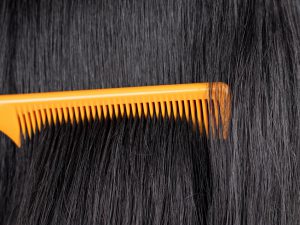Safer Hair Care For All

When it comes to hair care products, we all want to achieve healthy, shiny, and beautiful hair. However, many of the products we use on a regular basis may contain harmful chemicals that can damage our hair and even our health. In this blog, we’ll take a closer look at some of the chemicals to watch out for in hair products and how to choose safer alternatives.
1. Sulfates
Sulfates are one of the most common ingredients found in shampoo and other hair care products. They are responsible for creating the foaming lather that we associate with clean hair. However, sulfates can strip the hair of its natural oils, leaving it dry, brittle, and prone to breakage. They can also irritate the scalp and cause dandruff. Look for sulfate-free shampoos and natural conditioners, which are gentler on the hair and scalp.
2. Parabens
Parabens are preservatives that are commonly found in hair care products, as well as in skincare and cosmetic products. They are used to prevent the growth of bacteria and mold, but they have been linked to a number of health concerns, including hormonal disruption and breast cancer. Look for paraben-free products, which are less likely to cause these health problems.
3. Formaldehyde
Formaldehyde is a known carcinogen that is sometimes used as a preservative in hair straightening treatments and other hair care products. It can cause scalp irritation, hair loss, and respiratory problems, and it has been linked to an increased risk of cancer. Look for clean beauty products that are formaldehyde-free or that use alternative preservatives.
4. Phthalates
Phthalates are a group of chemicals that are often used to add fragrance to hair care products. They have been linked to hormonal disruption, reproductive problems, and birth defects. Look for products that are phthalate-free or that use natural fragrances, such as essential oils.
5. Polyethylene Glycol (PEG)
Polyethylene glycol (PEG) is a petroleum-based compound that is used as a thickener, emulsifier, and moisturizer in hair care products. It can cause skin irritation, and it has been linked to organ toxicity and developmental problems. Look for clean beauty products that are PEG-free or that use natural thickeners and emulsifiers.
6. Triclosan
Triclosan is an antibacterial agent that is sometimes added to hair care products, as well as to soaps and other personal care products. It has been linked to hormone disruption and antibiotic resistance, and it can also cause skin irritation. Look for products that are triclosan-free or that use natural antibacterial agents, such as tea tree oil.
7. Synthetic Colors
Synthetic colors are often added to hair care products to give them a more appealing appearance. However, many of these colors are made from coal tar, which has been linked to cancer and other health problems. Look for products that use natural colors, such as henna or plant extracts.
8. DEA and MEA
Diethanolamine (DEA) and monoethanolamine (MEA) are chemicals that are used to create a creamy texture in hair care products. They have been linked to liver and kidney damage, and they can also cause scalp irritation and hair loss. Look for hair care products that are DEA- and MEA-free or that use natural thickeners.
In conclusion, it is important to be aware of the chemicals that are commonly found in hair care products and to choose safer alternatives whenever possible. Look for products that are free of sulfates, parabens, formaldehyde, phthalates, PEG, triclosan, synthetic colors, DEA, and MEA. Instead, choose sulfate-free shampoos and natural conditioners that are made with plant-based ingredients and that have been certified by reputable organizations, such as the Environmental Working Group (EWG) or the Organic Trade Association (OTA). These products are safer for your hair and your health, and they are often more environmentally friendly as well.




